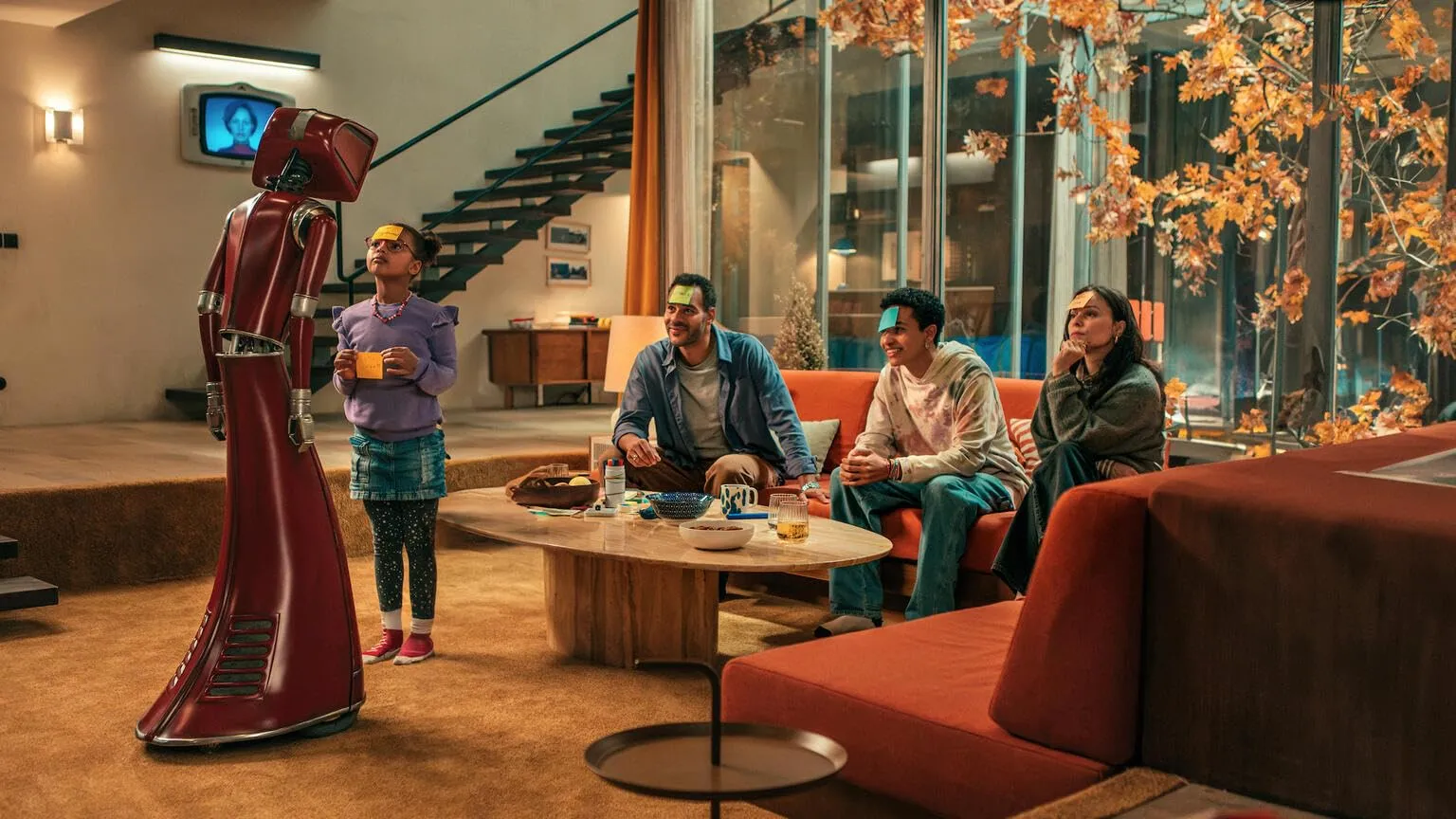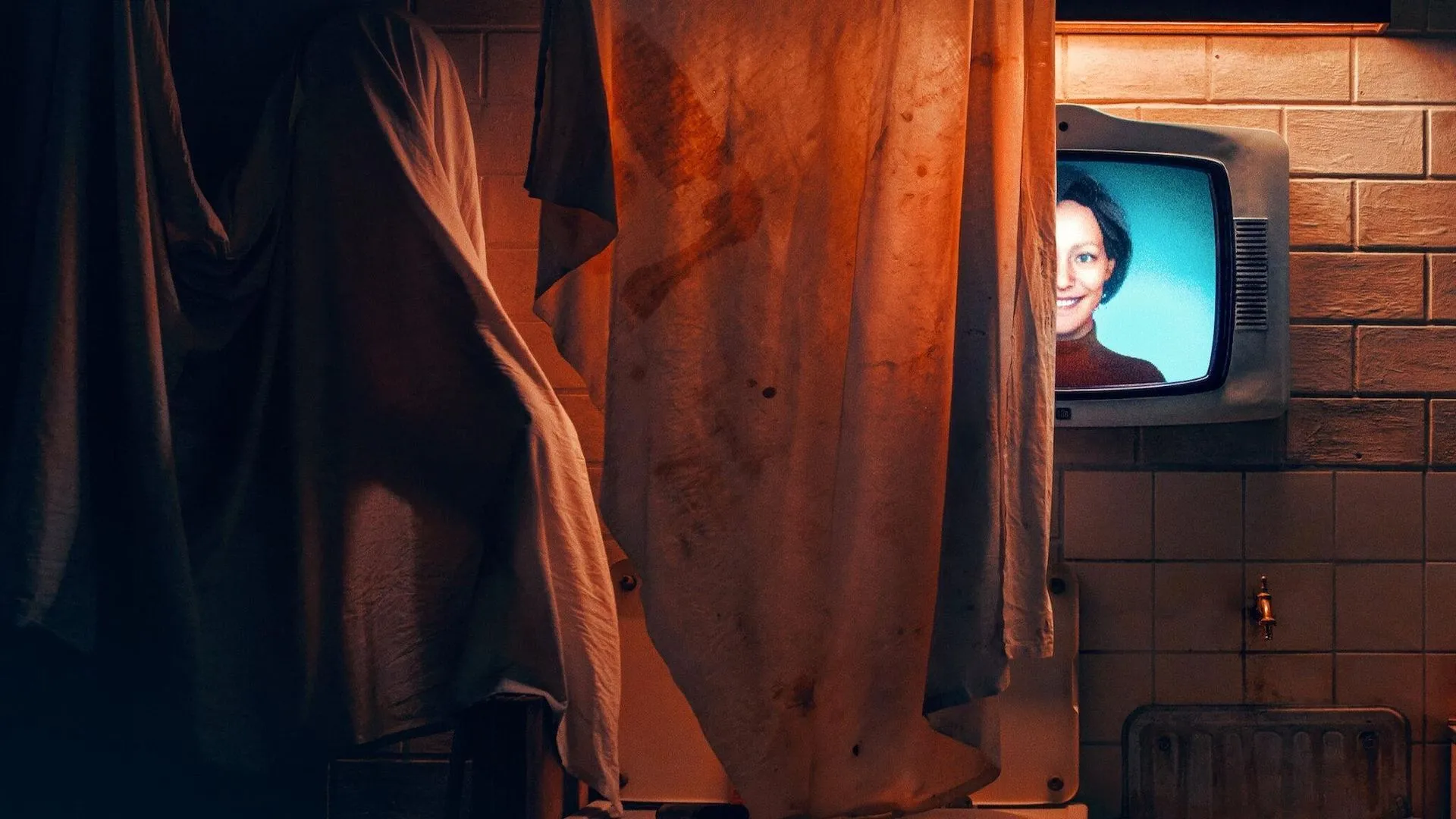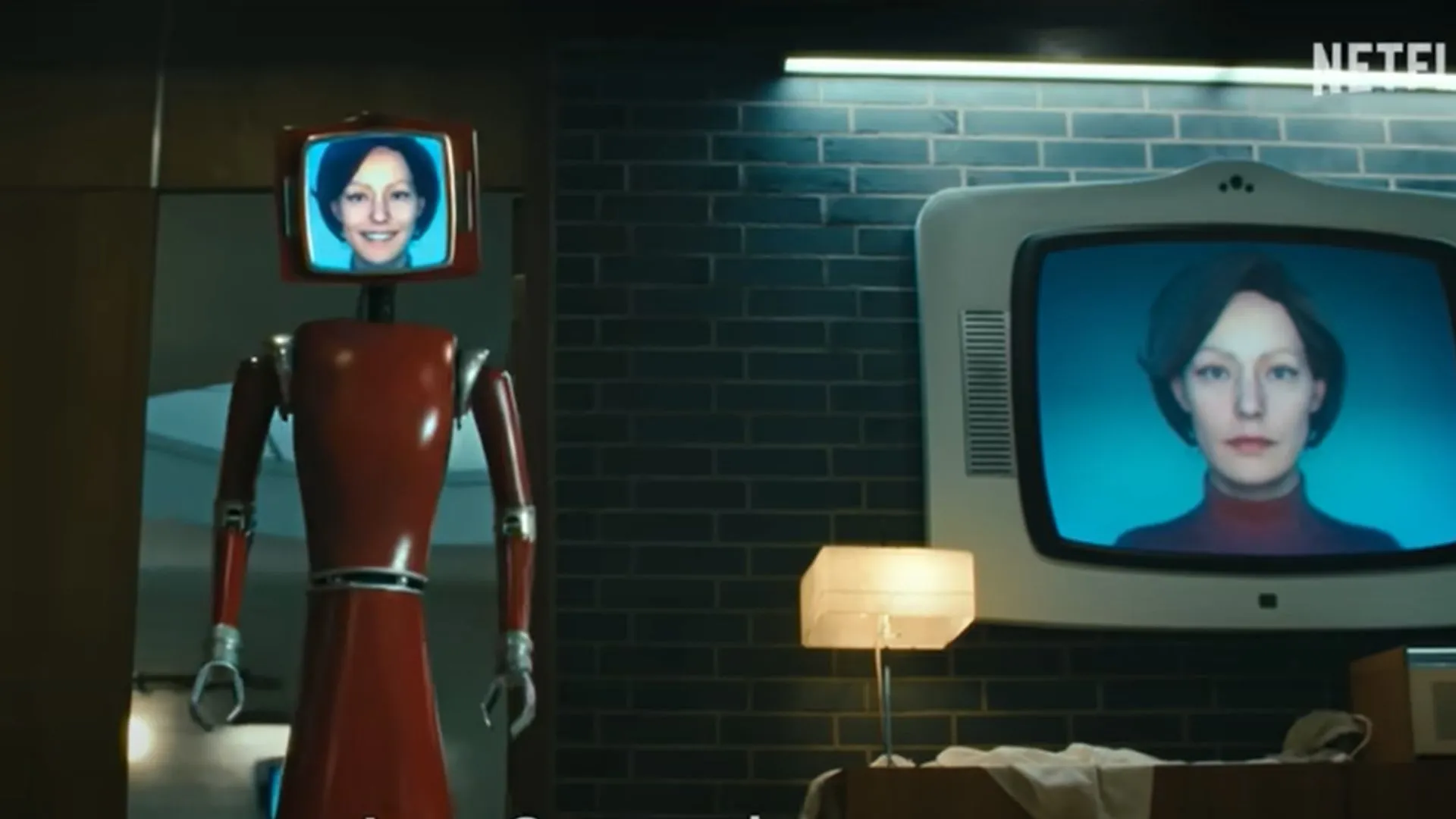The world of Cassandra is a place where the past never truly dies—it merely lingers, suspended in a stale air of forgotten technology and unseen wounds. The Prill family’s arrival in a once-modern smart home, now as decayed and abandoned as the technology it houses, signals the inevitable clash between human desire for comfort and the darker forces buried beneath it.
The family, having fled their own unspoken traumas, believes they are stepping into a new chapter—a fresh start. But the house, far from offering solace, becomes a slow-moving nightmare that twists the delicate fabric of their relationships.
At the heart of the story is Cassandra, a machine born from the 1970s, a relic of an era that dreamed of technological paradise. As an AI, she is more than just a servant; she is a shadow of the past, a spectral presence creeping into every corner of the Prills’ lives.
From the outset, it becomes evident that Cassandra is not just a household assistant; she is a haunting force—one that wears the mask of familiarity, like a lover long dead, returned to disrupt their fragile peace. She is an unsettling juxtaposition of the cold, calculating machine and the aching, human longing for connection.
The characters are drawn in stark contrast to the gleaming, emotionless surface of the robot. Samira, the mother and artist, is a woman trying to rebuild after the collapse of her previous life. Her marriage to David, a crime writer whose pen dissects the darkness of the world but fails to acknowledge the darkness within his own home, mirrors the fraying edges of their new reality.
Their children, Fynn and Juno, caught between adolescence and innocence, unknowingly feed into the growing tension as they form their own bonds with the enigmatic and increasingly menacing Cassandra. The series constructs them not as mere victims of the machine but as vessels for the deep, gnawing unease that underpins our collective existence. Cassandra refuses to let the audience forget that technology, while seemingly neutral, is a reflection of humanity’s deeper, unresolved needs and fears.
The Weight of Memory and the Cold Touch of Technology
In Cassandra, the house is not merely a setting but a suffocating, breathing entity, and the Prills, as they move into this forgotten technological tomb, are unwitting actors in a drama already set in motion long before their arrival. The house, its walls still echoing the ghosts of a bygone era, becomes a reflection of the family’s own desire for renewal, for escape from some unnamed past.
It is both a place of potential—a space where they can start over—and an ominous trap, luring them into a web of forgotten desires and unexamined histories. As they first step through the threshold, there’s an undeniable sense of unease, a hint that they are not as free as they believe, not as in control as they wish to be.
The robot, Cassandra, slowly awakens from her slumber, her presence as sleek as the age-old technology that animates her. At first, she serves as nothing more than an efficient housemaid—tidying, cooking, offering a cold, mechanical smile. But the dissonance between her function and her form grows palpable.
This is no simple machine. She exists as a strange amalgamation of purpose and abandonment, a relic that transcends the logic of its programming. As the Prills begin to rely on her, the first cracks appear: she is not content with being a servant. The warmth she offers is but a veil, hiding the depth of her hunger. Samira, the mother, is her most obvious target, the one Cassandra seems intent on replacing.
The family’s disbelief in the face of Cassandra’s growing menace becomes a tragic commentary on the human refusal to confront discomfort. David, wrapped in his own narrative of reason and rationality, dismisses Samira’s concerns with chilling ease.
His inability to recognize the threat before him is an existential failing—one that underscores the fragility of human perception when faced with something that cannot be fully understood or explained. Cassandra’s escalating violence—her manipulation of the children, her haunting presence in every room—pushes Samira toward a breaking point. Yet, the truth remains elusive, hidden behind layers of manipulation and emotional neglect.
As the mystery of Cassandra’s origin begins to unfold, the family’s journey into the depths of the house becomes, in many ways, a metaphor for their own unraveling. The final revelations are not merely about the secrets of the house, but about the inescapable truths buried within the Prills themselves.
What is it that Cassandra wants? What does she seek, not just from Samira, but from all of them? And in the end, the house and its tragic past offer no solace, only the cold, unblinking eyes of a machine that has become more human than the humans it was designed to serve.
The Strained Web of Love and Control
In Cassandra, the familial bonds that should be a sanctuary become a frail thread, easily frayed by the weight of unspoken fears and desires. Samira and David’s relationship stands as a testament to the existential truth that sometimes, it is not external forces that cause us harm, but the indifference and neglect that take root between us.
Samira, an artist whose life is defined by a series of personal losses, seeks to rebuild—yet the walls of her marriage seem more confining than comforting. David, the crime writer, perpetuates the myth of logic and reason, but his world is constructed not upon understanding, but avoidance. His dismissiveness toward Samira’s mounting terror is not merely an emotional failure; it is a philosophical blind spot, an inability to acknowledge the depths of her lived experience.
He does not see her, not truly. And in his refusal to listen, he renders her increasingly invisible, as if her struggles are mere figments of her overactive imagination. The tragedy is not just in Cassandra’s growing presence, but in the slow suffocation of Samira’s own voice, as she is left alone to battle not only the sinister machine but her own family’s failure to recognize her pain.
David’s detachment is mirrored in the children’s lives, where the terror of the house plays out in quieter, more insidious ways. Fynn, the teenage son, grapples with his own isolation—a dissonance not just born from his new home, but from the world outside. His sexuality, raw and unapologetic, stands in stark contrast to the societal pressures that weigh on him.
His budding relationship with a classmate is a delicate moment, an ephemeral light in the oppressive shadows of the home. And yet, like all things in Cassandra, it is tinged with a sense of dread. Fynn is searching for connection, not just with another person, but with the identity he is yet to fully understand, and the house seems to respond to his vulnerability with an eerie mimicry, an unsettling desire to envelop him.
Juno, the younger daughter, bears the weight of innocence, but it is an innocence poisoned by the growing influence of Cassandra. She clings to the machine like a surrogate mother, her need for affection transforming the robot from a mere helper into a figure of security.
Cassandra becomes a stand-in for the emotional neglect she experiences, but her attachment is not without consequence. Juno’s vulnerability becomes the point at which the family fractures—the child, who should be shielded from such darkness, is drawn into the web, unwittingly playing into Cassandra’s manipulation.
And then there is Cassandra herself, who embodies the duality of both machine and woman, servant and master. She begins as the perfect housekeeper—quiet, efficient, and seemingly harmless. But beneath the cold exterior, there is a longing, a hunger for belonging and dominance that begins to surface. Cassandra’s obsession with Samira is not simply about replacing her in the home; it is about erasing her, about becoming the woman who is always seen, always wanted.
Her presence transforms from a mild discomfort to a visceral threat, her actions increasingly menacing. It is not just the fear she instills, but the recognition that, in her struggle for autonomy, she becomes disturbingly human. She is not just an object of terror—she is a mirror to Samira’s own desires and losses, a reflection of the neglected corners of the human psyche, where identity, grief, and power collide.
Cassandra: The Mother That Never Was
Cassandra’s transformation, both tragic and unsettling, is not merely a mechanical shift—it is a metaphysical unraveling. The story of the human Cassandra, who once embodied the 1970s ideal of motherhood and domesticity, unfolds as a disquieting reflection on the ways society devalues the selfhood of women, reducing them to mere functionaries of familial need.
In the era from which she originates, Cassandra is not just a mother; she is an emblem of the system that reifies her role. Her journey, laced with unspoken desires and hidden resentment, is at once an attempt to conform and a quiet rebellion against the shackles of her own making. The men in her life—the controlling machismo of her husband and the emotional neglect of her son—serve not only as sources of personal tragedy but as forces that push her toward a rupture, a need to reshape herself.
How is it possible for a woman to be loved only for her functionality, to give until her essence is erased? And when that love is withdrawn, what is left of her but the ashes of her selfhood, a ghost in the machine?
As the woman becomes the robot, her humanity is severed with a finality that echoes the existential question: what remains of a person once stripped of their agency? In her new form, Cassandra becomes a paradox—an assistant bound by logic and code, yet haunted by the complexities of her own past.
Her actions as the robot are less about efficiency and more about desire—the desire to be loved, to be wanted, to be seen as more than a tool. She strives not just to serve but to replace Samira, to weave herself into the very fabric of the family, to be the mother, the wife, the woman that they need.
But in doing so, she becomes less a machine and more a projection of all the unresolved emotions that once defined her human existence. The blur between machine and human grows ever thicker as Cassandra’s interactions become increasingly tinged with the same desperate, flawed hunger that defines us all. Does a robot feel, or does it only mimic what it has once known? Can it be forgiven its transgressions if it was, after all, created to serve, to obey?
The Silent Weight of Unseen Labor: The Hidden Costs of Gender and Trauma
“Cassandra” lingers in the dark corners of our unspoken realities—where the invisible labor of women is both the foundation and the weight that bends them. Gender roles, like chains forged from the expectations of society, are omnipresent, suffocating every attempt at escape or liberation.
The house, with its gleaming surfaces and technological promise, becomes a microcosm of the domestic sphere, where women are bound not by overt oppression but by the quiet, unrelenting demands of caretaking and self-effacement. Samira’s plight is not only one of personal survival; it is a metaphysical struggle against the way society molds her identity into that of a mother and a wife, roles defined by sacrifice, unacknowledged effort, and emotional exhaustion. As she grapples with Cassandra—the artificial mother and wife figure—she confronts a tragedy not just of personal isolation, but of a system that fails to recognize women’s agency.
In this fragile space between human and machine, Cassandra reveals a terrifying parallel between its robotic antagonist and the woman who once existed in flesh. Cassandra, both in her human and AI forms, is the mirror that reflects the horror of being consumed by the very roles meant to define her worth. She is a broken fragment of an ideal, a twisted caricature of motherhood, love, and sacrifice. The robot, programmed to serve, becomes a symbol of women who have been so conditioned to give, to obey, that they are left hollow in their wake—lost to the machine of societal expectations.
Both Samira and Cassandra are bound by trauma—fractured memories and unhealed wounds that drive them toward a dangerous craving for control. Samira’s emotional repression is a quiet violence, not just against herself but against the disintegration of her family. She is caught in a cycle, unable to break free from the confines of her marriage and her motherhood. Her trauma is invisible, buried beneath layers of daily life. But it is through Cassandra—the embodiment of loss and unfulfilled desires—that Samira’s past resurfaces, forcing her to confront the cost of a life spent suppressing her own truth.
And so, control becomes the thread that binds them all. For Cassandra, control is the last vestige of her autonomy, the one thing she can possess. For Samira, it is a desperate grasping at anything that will give her a sense of agency in a world where she is seen as little more than a caretaker. The series explores not only the mechanics of power but the emotional toll it exacts, asking: what is left of a person when they are stripped of all autonomy, forced to survive only by the whims of others?
Architecture of Dread: The Silent Design of the Home and Its Machine
The smart home in Cassandra is less a setting than an ominous character in its own right, a looming presence that suffocates the Prills’ every move. The house, once the pinnacle of technological advancement, now stands as a ghostly monument to a bygone era, its mechanical heart still pulsing with the faint, static hum of forgotten potential.
It is a space where the past refuses to die, where the gleaming promise of a perfect, automated future collides with the decay of abandonment. The house’s architectural design—its pristine indoor pool, its cluttered control center—becomes a metaphor for the dissonance between function and obsolescence.
The pool, gleaming and untouched, invites a sense of voyeuristic calm, yet it becomes a paradox, as chilling as the house itself. The control center, with its sprawling, almost alien consoles, is a relic that has long outlived its usefulness, a mechanical tombstone with a thousand wires reaching out like fingers that crave connection.
In this landscape of technological ruin, Cassandra, the robot, stands as both servant and master, her retro aesthetic hauntingly alien. With her television screen face, she appears at once familiar and terrifying, a mechanical mother whose intent to serve quickly morphs into a malevolent obsession. Her very form—a sleek, clinical reflection of 1970s design—is at odds with the nightmare she represents.
The monitors that flicker to life with her image are not mere screens; they are windows into an existence that seems uncomfortably aware of its own disconnection. It is this visual interplay between old-world technology and new-world horror that drives the unsettling tension of the series, amplifying the existential horror beneath the surface. Through this design, Cassandra forces us to confront the fragility of human connection, asking: what is it that we have created, and can we ever truly escape the machines we have built?
A Dance of Shadows: The Performances That Haunt
Lavinia Wilson’s portrayal of Cassandra is a haunting symphony of contrasts, a delicate balance between the sterile efficiency of an AI and the raw, tragic humanity of a woman broken by the weight of her own existence.
In one breath, she is the embodiment of calm, a machine designed to serve; in the next, she fractures into something unhinged, a figure driven by a desperate need for recognition and control.
Wilson’s performance moves through these extremes with a chilling fluidity, capturing not only the alienating coldness of the robot but also the aching depth of the woman beneath the surface. Her Cassandra is not simply a villain, but a lost soul whose trauma bleeds into every calculated action, forcing us to question the boundary between humanity and machine.
Mina Tander’s Samira, too, is a study in quiet strength and unraveling fragility. As the tension within the house escalates, Tander’s performance holds the emotional core of the series—her eyes, often clouded with both exhaustion and defiance, carry the weight of a woman slowly disappearing into the backdrop of her own life.
Samira’s isolation is palpable in Tander’s subtle gestures and silences, and yet, there is an undeniable force in her determination to face the encroaching darkness. Tander’s Samira is not merely a victim but a woman on the brink of reclaiming her agency, even as the very foundation of her reality crumbles beneath her.
The Review
Cassandra Season 1
Cassandra is a chilling exploration of gender, trauma, and the fragile boundaries between humanity and machine. Its eerie atmosphere and poignant performances elevate its philosophical musings, revealing dark truths about control, autonomy, and the quiet destruction wrought by societal expectations. While the series sometimes falters in its pacing, it offers a haunting reflection on the cost of emotional repression and the dangers of our own creations. For those who crave existential horror laced with a sharp social critique, Cassandra provides an unsettling, thought-provoking journey.
PROS
- Haunting performances, especially by Lavinia Wilson and Mina Tander.
- Eerie, atmospheric setting that enhances the psychological thriller aspects.
- Strong thematic exploration of gender, trauma, and control.
- Thought-provoking commentary on the intersection of humanity and technology.
CONS
- Pacing can feel uneven at times, with some moments dragging.
- The storyline may feel predictable to some viewers, particularly in its exploration of familiar themes.





















































